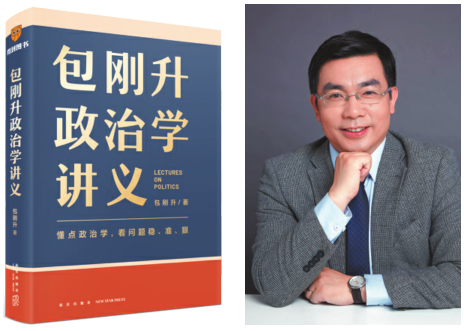A PUBLIC LESSON IN POLITICS
Book shows how reason and logic can help grasp subject, Yang Yang reports.

Advances in social media have enabled users to voice their opinions online and comment on a variety of topics, including political issues. However, as most people have limited knowledge of such issues, social media is often inundated with conspiracy theories, which may lead to hostility, hate speech, or worse.
Bao Gangsheng, professor at Fudan University's School of International Relations and Public Affairs, says that one of the reasons is that the public lacks a fundamental understanding of politics.
"In popular culture, people's notions of politics may not only be inconsistent with facts and logic, but are often aimed at playing to their emotions. Learning political science can help people use reason and logic to break free of the political biases created by popular culture," Bao writes in his latest book, Lectures on Politics.
Published recently by knowledge-sharing platform Dedao under New Star Press, Lectures on Politics is based on an audio course Bao gave on the platform. Launched in 2019, the 30-episode course has more than a million hits from 40,000 users, making it one of the most popular courses on the platform.
Through the 30 lectures, Bao builds a framework of political science that systematically explains the basic logic of political phenomena through 30 keywords including nation, war, monarchy, bureaucracy, republic, parliament, democracy and party from five different perspectives, such as how power manages society, how society controls power, differences and conflicts in politics, and the political issues closely related to them.
In the 249-page book, Bao uses concise language to lead readers through the world of politics focusing on interesting questions in each chapter such as: Why did democracy originate among pirates? Why do wars shape a country? How can monarchies last thousands of years? Why do many African countries have democratic regimes, yet have increasingly moved toward decline? And why do many countries not support the construction of a welfare state?
By referencing classic political issues in human civilization, Bao tries to take readers back to the historical moment in question to see how political invention emerged in different countries, to examine the logic in making political decisions at critical moments, and to explore the potential solutions for improving politics in the narrow gap that exists between idealism and reality.
Li Yun, professor at the China University of Political Science and Law's School of Political Science and Public Administration, comments on the book by saying that "as Professor Bao Gangsheng has said, politics is the art of balance".
"After reading this book, you will have a deeper understanding of how, as a massive community, a country navigates complex situations over decades or even centuries, survives, and evolves through continuous balancing and negotiation," Li says.
Since Politics of Democratic Breakdown came out in 2014, with an English version coming out in 2022, Bao has published seven books, including The Common Sense of Modern Politics in 2015 and Political Evolution: From Ancient Times to the Twenty-First Century in 2023. On Douban, a major Chinese review aggregator, more than 7,200 readers gave The Common Sense of Modern Politics a rating of 9.1 out of 10, making it Bao's most popular book so far.
Now Lectures on Politics is also getting a good reception, with another rating of 9.1 out of 10 on Douban. One reader named Hou Ying comments that "the book is a good means for the public to develop a basic understanding of political science, a subject that everyone seems to be able to comment on but actually knows little about".
Bao says: "Now if you want to learn politics, there are many platforms. However, there are also many short videos created for the sake of traffic, in which some creators present inaccurate information, fake news and rumors."
People tend to see international relations and politics through biases, and online dissemination has exacerbated the trend, he says.
"There is a formula for making videos to attract more views — tendentious ideas, simple expression and a clear attitude — designed to please fans. But this kind of formula results in many problems, including the misunderstanding of politics," he says.
For example, he says that many people mistake political science for the study of palace intrigue, which is just one possible topic of the discipline.
"Politics is omnipresent, not only in states, but also in companies and families, all human organizations," he writes in the book. Basically, politics is the way people live together.
Another major source of misunderstanding involves international relations.
"For one thing, international relations are very complicated. For another, public opinion can greatly influence the framing of international political issues on social media," Bao says.
His next book, The Fate of Civilization States: From Political Crisis to Modernization, is set to be published. It is about the political and economic transformation of civilization states of both the East and the West, including Russia, Iran, Egypt and India, following the rise of Great Britain in the 18th century.
For the next project, he plans to write a book that offers a new understanding of ancient Chinese political history from the perspective of modern social science and comparative politics.

Today's Top News
- China condemns US $330m arms sale to Taiwan
- Root causes behind Takaichi's provocative remarks alarming for all
- China to maintain pressure on Japan over PM's Taiwan comments
- Free trade zones incubators for nationwide policies
- US scholar: China's 15th Five-Year Plan charts path to future
- Coding the law for smart governance






























